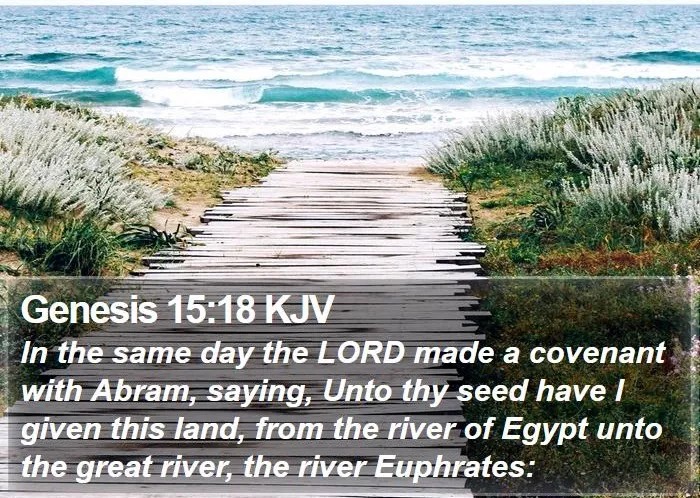Read the Daily Bible Verse Genesis 15:18 To Strengthen Your Spiritual Journey.
Genesis 15:18 is a pivotal verse in the Old Testament, encapsulating a significant moment in the covenant between God and Abram (later Abraham). This verse reads: “In the same day the Lord made a covenant with Abram, saying, Unto thy seed have I given this land, from the river of Egypt unto the great river, the river Euphrates.” This covenant is a cornerstone in the Abrahamic promise, underscoring God’s commitment to Abram and his descendants, shaping the future of the Israelites and influencing theological interpretations throughout the Bible.
The Context on Genesis 15:18 KJV
To understand Genesis 15:18, it is essential to examine its context within Genesis 15. This chapter is crucial in the narrative of Abram, who is later renamed Abraham. The chapter begins with God appearing to Abram in a vision, reassuring him of a future reward despite his old age and childlessness. Abram questions how he can be assured of God’s promises, leading to a divine response that includes a symbolic vision and the establishment of a covenant.
The covenant described in Genesis 15:18 is part of a larger narrative where God makes a formal agreement with Abram. This occurs after Abram has been given a vision of the future and a prophetic revelation of the trials and triumphs his descendants will face. The covenant itself is marked by a ritual involving the sacrifice of animals, which symbolizes the solemn nature of the agreement between God and Abram.
The Genesis 15:18 Meaning
Genesis 15:18 signifies the formalization of God’s promises to Abram. The verse highlights several key points:
Divine Assurance: God reaffirms His promises to Abram, providing him with a tangible assurance of the land that will belong to his descendants. The use of “In the same day” emphasizes the immediacy and certainty of this promise.
Extent of the Land: The land promised to Abram’s descendants stretches from the river of Egypt to the Euphrates, covering a vast region. This extensive promise underscores the significance of the covenant and its impact on the future of Abram’s lineage.
Covenantal Relationship: The verse establishes a formal agreement, indicating a binding and enduring commitment from God. This covenant is a foundational element in the theological and historical narrative of Israel.
Genesis 15:18 Application in Life
The implications of Genesis 15:18 extend beyond the historical context into personal and communal faith practices:
Trust in Divine Promises: Believers can draw inspiration from Abram’s trust in God’s promises. The verse encourages faith in God’s assurances and patience in awaiting their fulfillment, even when circumstances seem challenging.
Understanding God’s Faithfulness: The covenant represents God’s unwavering commitment to His people. This assurance can be a source of comfort and strength for individuals facing uncertainty or difficulty, reminding them of God’s faithfulness in their lives.
Ethical Implications: The concept of covenant involves responsibilities and ethical conduct. Believers are encouraged to reflect on their commitment to God’s promises and the ethical dimensions of living out their faith.
See Also: Genesis 15:17 Meaning, Context & Commentary
Comparison with Other Biblical Texts
Genesis 15:18 can be compared to several other biblical texts to gain a deeper understanding of its significance:
Exodus 23:31: This verse reaffirms the promise of land to the Israelites, echoing the geographical boundaries mentioned in Genesis 15:18. It highlights the continuity of God’s promise from Abram to Moses and the Israelites.
Deuteronomy 1:7: This passage reiterates the extent of the promised land, reinforcing the covenant’s scope and emphasizing its fulfillment in the conquest narratives.
Galatians 3:16: The New Testament provides a Christological interpretation of the covenant, noting that the promises were made to Abraham and his “seed,” which is identified as Christ. This text connects the Old Testament covenant to the New Testament understanding of salvation and faith.
Modern-Day Relevance
Genesis 15:18 continues to hold relevance in contemporary faith practices and theological discussions:
Covenantal Theology: The concept of covenant remains central in Christian theology, influencing discussions on God’s promises, faith, and the nature of divine-human relationships. Understanding Genesis 15:18 aids in grasping the broader implications of covenant theology.
Interfaith Dialogue: The covenant between God and Abram is foundational for both Judaism and Christianity. Recognizing its significance fosters mutual understanding and respect in interfaith dialogues and discussions about shared heritage and promises.
Historical Understanding: For scholars and students of biblical history, Genesis 15:18 provides insight into the historical and geographical context of the Abrahamic covenant. This understanding contributes to a more comprehensive view of ancient Near Eastern history and its impact on religious traditions.
Conclusion
Genesis 15:18 represents a cornerstone of the Abrahamic covenant, highlighting God’s promise of land to Abram’s descendants and establishing a formal agreement that shapes the narrative of Israel. The verse emphasizes divine assurance, the extent of the promised land, and the significance of the covenant in the theological and historical context.
By exploring its meaning, application, and relevance, believers can draw lessons of faith, trust, and commitment. The comparison with other biblical texts and its modern-day implications underscore the enduring impact of Genesis 15:18 on theological thought and faith practices.
Genesis 15:18 Commentary
The commentary on Genesis 15:18 often focuses on the covenant’s theological implications and its role in shaping the biblical narrative. Scholars note that the covenant signifies a deep and abiding promise from God, emphasizing His commitment to Abram and his descendants. The extensive boundaries of the promised land symbolize the grandeur of God’s promises and His intention for a lasting relationship with His people.
The ritual described in the broader context of Genesis 15, involving the sacrifice of animals, underscores the solemnity of the covenant. This act symbolizes the seriousness of the agreement and the consequences of breaking it, reflecting the gravity of God’s promises.
Overall, Genesis 15:18 stands as a testament to God’s faithfulness and the enduring nature of His promises, offering valuable lessons for both historical understanding and contemporary faith practices.


